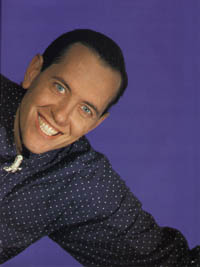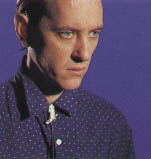The “E” Spot
Blitz Magazine – June 1989
By Paul Mathur
It’s the E. It hovers boldly between the most normal of names, butting in, making you wonder, daring you to ask. But for now it’s safely shackled above our heads. It’ll wait, “Do you know, what you’re going to write about somebody before you even do the interview?” Richard E Grant asks alot of questions. Buckets of them. Sometimes he’ll even flip your own enquiry on its head and lob it back to you before you’ve had time to plug your ears.
This is what it feels like on the other side of the celebrity fence and by golly it’s funny. Sort of like therapy without the cheque. “No, I’m not interested. Really”.
E is for Elusive. Richard E Grant’s most notable screen role to date is that of Withnail, the surgical spirit-swagging, chain-smoking, grimy genuis of ‘Withnail & I’. Most recently he can be seen as both a displaced 17th-century witch-hunter in 20th-century LA (‘Warlock’) and as a manic advertising executive with a boil on his neck that turns into another head (‘How To Get Ahead In Advertising’). Disparate roles for sure, but through them all a vein of fiery awkwardness, a sense of not quite fitting in with the world around him. A bit of a wanderer. We decide, inevitable, to meet at a hotel. “Look at all these people with their portable phones and their expense account Olde English Teas. I bet they think we’re rent boys.” In a dim light he might just look the part. The lean, vaguely gangly frame, the black leather jacket, the piercing blue eyes flicking confidently around the room. The critics are saying he’s a bit Peter O’Toole, a bit Tim Curry, a bit, well, combustible. Richard E Grant, they say, knows how to burn. “Do I? You have to tell me, Paul. I really have no idea.” Eight years ago Grant had just graduated from Cape Town University and was in the process of founding the Troupe Theatre Company, a small scale, if ambitious acting ensemble in his native Africa. This month two of the four films he has made this year open in America, both of which keep Grant on screen for almost every frame. Oh, yes, he’s burning all right.
“It’s funny. I’m beginning to be successful, starting to get offered good parts and suddenly I’m aware of this feeling amongst some of my peers that I’ve sold out. there’s no other profession, be it racing driver or athlete, where as soon as you get good at what you do people start to dump on you. There’s tremendous snobbery, particularly from stage actors, where as soon as you start acting in movies you’ve sold out. Still, as Liberace once said, I’m crying all the way to the bank”

Grant has come a long way from Mdabane, Swailand, where he grew up the son of an expatriate educational programme officer. The town, although a capital city, was “like two backstreets on the edge of Manchester” with a couple of small cinemas showing a bizarre mix of films. The first, he remembers, featured “a huge American car sinking into a swamp. It was such a marvellous image”. Sometimes shortly afterward, Richard E Grant decided that he wanted to be an actor.
After studying for a Drama degree and working with the aforementioned theatre group, he left for England in 1982 with a couple of suitcases and a head full of big ambitions. He was 25. “I gave myself ten years to make a success of acting, and I did it with five to spare. I’m not being arrogant, but I think you need that sense of purpose or you might as well just give up.” Extensive stage work in this country, a small role in “a dog of a film” called ‘Hidden City’ and a part in the TV drama ‘Honest, Decent & True’ brough him to the attention of Bruce Robinson, who was casting for ‘Withnail & I’. Daniel Day Lewis had just turned down the role to film ‘The Unbearable Lightness Of being’ and opportunity delievered its first fateful rap.
“I was lucky. I went to the audition with a copy of ‘Robinson Crusoe’, which just happened to be one of Bruce’s favourite books. And it was pissing down all the way there, so I looked the part. It was great to do, but when I saw myself on film I thought, ‘Get a nose job, get a face job, retire!’ I’ve begun to overcome that now, but I feel uncomfortable watching myself on screen.” His strength comes perhaps from that out-of-kilter presence. He doesn’t so much project as tear himself from the celluloid and into the laps of the first three rows. Trying to ignore him is like trying to look the other way while a tiger savages your chest. More madness than method?
“Well I’ve never gone for that Method thing at all. I mean, I’m an actor. By definition I’m acting, pretending. I’m not going to start travelling through time just so I can live a part.” The travelling through time comes in ‘Warlock’, Grant’s first big-budget Hollywood movie. Yet again, he got the part after it had been rejected by rather more well-known actors, in this case Sean Connery and Michael Douglas. “They wanted originally to make it a star vehicle, but they were landed with me they had a rethink and decided to make it a concept movie. I helped them along by telling them that I thought my character should be like beef jerky. Dry, hard and kind of forceful. That confused them a bit, but they gave me the part.”
At the mention of Connery, Hollywood and limos, a few of the pinstriped ears start to prick. Hey, this guy’s famous. He’s kissed Lori Singer, you know, the blonde from ‘Footloose’. He’s probably met Clint Eastwood. Damned if we know who is this though. “I don’t get recognised here, but in LA I was getting waiters coming up to me and telling me how much they loved me in ‘Withnail’. You’re driven everywhere in long, black cars with people sitting fifteen feet away telling you how they think you’re God’s gift to acting, inviting you to parties, everything. I thought, fuck the serious actor, I’m going to wallow in this for a bit.”

One wonders how easy it must have been to take the ‘Warlock’ role seriously. Can you really lose yourself on screen when you’re dressed in a bearskin, ranting in the middle of a freeway to an allegedly 60 year old Lori Singer?
“You have to, it’s your job. I must admit it was a bit difficult at times, but I could always go back and do it again if I got too self-conscious. You can’t think all the time about what you’re going to look like or you end up indulging in this tense, rearview mirror kind of acting. That’s pointless.”
As he waves his hand to elaborate, he sends his long, thin non-alcoholic cocktail flying across the table. The gathered tea-sippers are begining to think he’s Richard Harris. They move away a bit in case he clocks them one. Once they’ve seen ‘ How To Get Ahead In Advertising’ (another Bruce Robinson – directed opus) they’ll be even more scared of him. He plays Dennis Dimbleby Bagley, one of the steely, evangelical new breed of advertising executives – a man whose moral poison quite literally bursts through his skin, eventually taking over his body. it’s the perfect vehicle for Grant’s most enjoyable acting capabilities – the manic jitteriness, a trembling body on the verge of complete breakdown. There’s a few scenes that recall ‘Withnail’ – the bath, the chicken, the wanton embrace of complete depravity – but the part is ultimately stronger allowing him to twist imperceptibly from good to evil. As an indictment of the advertising industry it will tell you little that you don’t already know and, worse, it relies on rather to many inaccurate stereotypes to flesh out what is basically a one-man, two-headed show. However, it should convince cinema audiences that Grant is a volatile, fascinating talent. Does Richard E Grant hold Richard E Grant in high regard? “Does Mathur love Mathur?”
Oh don’t start that again. Answer the question. “Yes, if you think about it, which I rarely do, I’m happy with myself. As an actor you get to the stage where you think, ‘ Yes, I’ve made it, I’m going to be happy for the rest of my life.’ So you work solidly for a year, then you get a bit tired and take some time off. You potter around the house, unwind, think about how good life is and then suddenly you wake up in a blind panic one morning thinking, ‘ What if that was it? What if I never get offered another part again?’ You live your life in this constant swing between security and self-doubt, but at least I’m working which is relatively rare for an actor.”
Grant’s not just working, he’s positively submerging himself in his art. Apart from ‘Warlock’ and ‘How To Get Ahead In Advertising’, he can be seen later in this year in Bob Rafelson’s ‘Mountains Of The Moon’ (“I play a nasty JR kind of character”) and Michael Austin’s ‘Killing Dad’. In the latter, based on a cult Sixities novel, he is a hair tonic salesman to whom there is more than meets the eye. A talking toupee, perchance? “Not quite, but my hairstyle is very, um, 13th-century in its proportions. It’s another weird one.”
Surprisingly Grant hasn’t been offered any other scripts demanding an alcoholic bedsit poet, but casting directors certainly seem to recognise his sense of peripheral presence. Some dullards will attribute it to his South African upbringing, which makes him a real rather than metaphoric outsider, but the truth is harder to pin down. His extraodinary knack for acting out of step with his surroundings slides most effectively into charismatic self-possession. Rather than seducing the camera, he dares it to pin him down, offers glimmers of tranquility in the middle of frenetic physicality. It’s a schizophrenic quality that’s best suited to black comedy as his roles so far have shown, and in that he is the consummate Nineties actor. In a world gone mad, what better public face than this get-a-nose-job hurricane with the icy blue eyes? “I’ve had good press so far, and I’ve been pleased with most of what I’ve done, but it’s only the start. I could go down the dumper by the end of the year quite easily.”
It’s about as likely as a snowdrift in the Sahara. Cream teas concluded, the business and tourists settle into their seats for a late afternoon snooze, convinced at last that the rent boy in black isn’t famous enough to warrant their attention. Grant springs to his feet, quick for sure, but not quick enough to escape the Big One, the question that will sort it all out. So what does teh E stand for? “The E? Oh nothing. I put it in there so that it would stand out on my calling card. It makes people look twice.”




